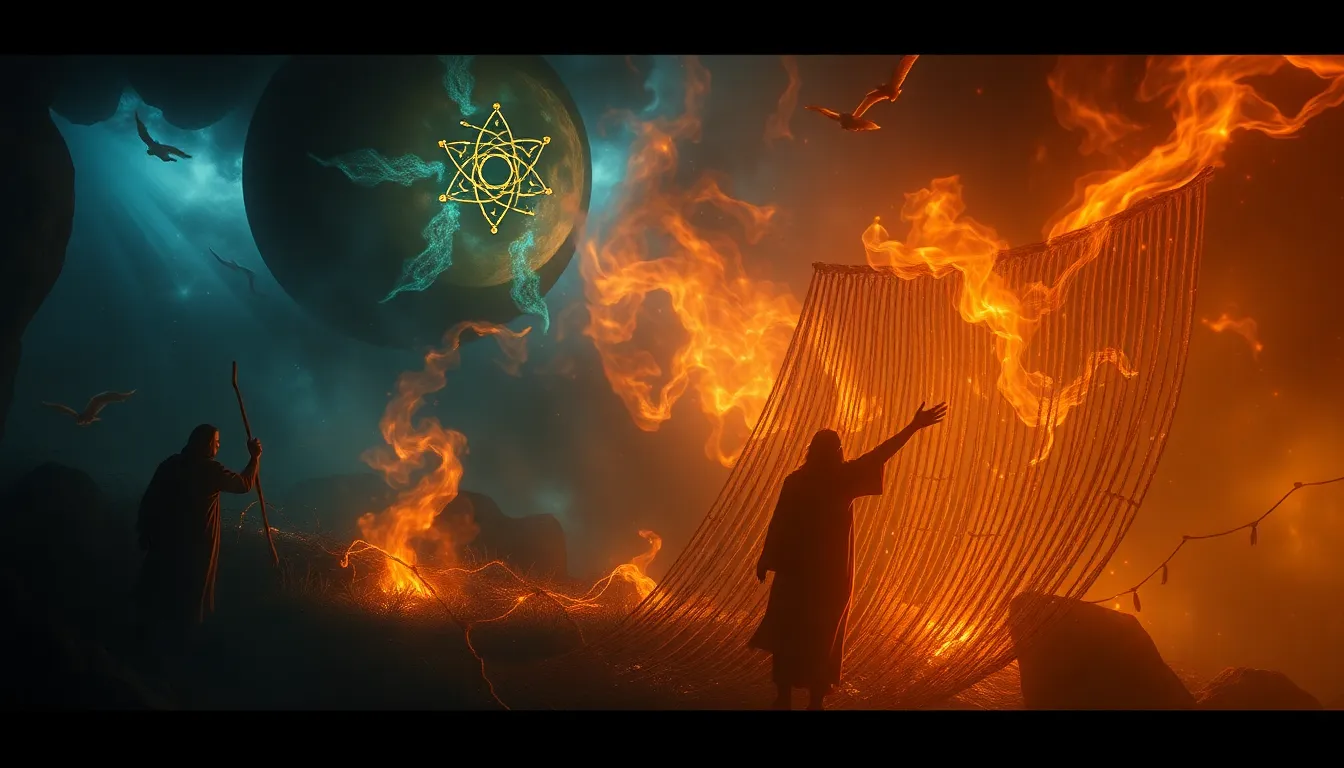The Cataclysmic Waters: Flood Myths That Foretell the End of Days
Introduction: The Universal Theme of Flood Myths
Across cultures and time, flood myths have emerged as a powerful narrative device that speaks to humanity’s deepest fears and hopes. From ancient Mesopotamia to contemporary storytelling, these tales often depict a world ravaged by water, symbolizing both destruction and renewal. The symbolism of water, as both life-giving and life-taking, serves as a dual reminder of nature’s power and humanity’s vulnerability. This article aims to explore flood myths as harbingers of doom, highlighting their significance in various cultures and their implications for understanding our own existence.
The Genesis of Flood Myths: Historical Context
The origins of flood narratives can be traced back to ancient civilizations, where they served as explanations for natural disasters and societal upheavals. These narratives often arose in environments where flooding was a common occurrence, such as river valleys. Environmental factors, such as catastrophic floods, droughts, or the rise and fall of civilizations, played a crucial role in shaping these stories.
Oral traditions were instrumental in preserving flood myths, allowing them to be passed down through generations. As societies evolved, these myths adapted, reflecting changing cultural values and social structures. The resulting stories became integral to the identity of various communities, often serving as moral lessons or cautionary tales.
The Mesopotamian Legacy: The Epic of Gilgamesh
One of the earliest and most significant flood narratives can be found in the Epic of Gilgamesh, a cornerstone of Mesopotamian literature. In this epic, the character Utnapishtim receives a divine warning about an impending flood meant to destroy humanity. He is instructed to build a massive boat to save himself, his family, and samples of all living creatures.
The flood story in the Epic of Gilgamesh bears striking similarities to the biblical flood narrative of Noah’s Ark. Both narratives feature a chosen survivor, a divine warning, and the preservation of life through a vessel. However, the motivations behind the floods and the outcomes differ, illustrating varying cultural understandings of divine intervention and human morality.
The Biblical Flood: Noah’s Ark and Its Implications
The biblical account of Noah’s Ark, found in the Book of Genesis, is perhaps the most well-known flood myth. In this narrative, God decides to flood the earth as a punishment for humanity’s wickedness. Noah, deemed righteous, is instructed to build an ark to save his family and pairs of every animal.
This story is rich with themes of divine judgment and mercy. It raises profound questions about sin, redemption, and the nature of humanity. The covenant established between God and Noah after the flood, symbolized by the rainbow, signifies hope and a fresh start for humanity. This narrative serves as a reminder of the consequences of moral failure and the possibility of rebirth through repentance.
Global Perspectives: Flood Myths from Diverse Cultures
Flood myths are not confined to the Western canon; they appear in various cultures around the world, each with unique elements and themes. Here are a few notable examples:
- Hinduism: The story of Manu and the Matsya Avatar tells of a great flood where the god Vishnu takes the form of a fish to save Manu, the progenitor of humanity.
- Native American Legends: The Ojibwe people recount the Great Flood, where the creator purifies the earth, and only a few survive to start anew.
- Chinese Mythology: The tale of the Great Flood features the hero Yu, who tamed the floods and brought order to the land, symbolizing human resilience and ingenuity.
Common themes across these narratives include divine intervention, the preservation of life, and the restoration of balance, reflecting universal anxieties about chaos and the desire for renewal.
The Psychological and Societal Impact of Flood Myths
Flood myths often mirror societal anxieties and fears, serving as metaphors for personal and collective crises. The overwhelming power of water can symbolize emotional turmoil, loss, and existential dread. In literature and art, water often represents a cleansing force, suggesting that destruction can lead to rebirth.
The psychological effects of these myths are profound. They can evoke feelings of helplessness in the face of nature’s fury while simultaneously inspiring hope for renewal and survival. The duality of water as both a destructive and life-giving force resonates deeply within the human psyche, prompting reflection on our relationship with nature and each other.
Modern Interpretations: Flood Myths in Contemporary Culture
In recent years, flood themes have resurged in modern media, appearing in films, books, and video games. These contemporary interpretations often connect ancient narratives to current issues such as climate change and environmental degradation. The stories serve as a cautionary tale, urging society to acknowledge and respond to the escalating threats posed by nature.
Technology has played a pivotal role in retelling these ancient narratives, allowing for new interpretations and adaptations that resonate with contemporary audiences. Whether through graphic novels, animated films, or interactive games, the essence of flood myths continues to captivate and educate.
Theological Reflections: Flood Myths and Eschatology
Flood myths often inform beliefs about the end of days, intertwining creation, destruction, and rebirth within religious texts. Many cultures view floods as divine cleansing events, marking a transition from one era to another. The relationship between these cataclysmic events and human morality raises questions about accountability and the potential for redemption.
Predictions and prophecies linked to cataclysmic events often emphasize the need for vigilance and moral integrity. These narratives remind believers of the consequences of straying from righteous paths and the hope for salvation through adherence to divine teachings.
Lessons from the Myths: Preparing for Our Own Deluge
The relevance of flood myths extends beyond their historical and cultural significance; they offer valuable lessons for contemporary society. As we face increasing environmental challenges and the threat of natural disasters, these myths serve as stark reminders of our vulnerability and the importance of preparedness.
By reflecting on the themes present in flood myths—such as resilience, community, and moral responsibility—we can better equip ourselves to navigate the complexities of modern life. The stories urge us to foster a deeper connection with nature, prioritize sustainability, and acknowledge our shared humanity in times of crisis.



